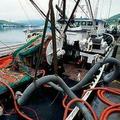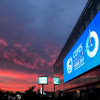 據世界自然基金會(WWF)一份新報告指出,過渡捕撈大西洋鱈與阿拉斯加鱈已經對當地的漁業造成威脅,也降低了生態系統對氣候變遷的應變力,但因有利可圖,非法捕撈在該地區依舊猖獗。挪威政府的統計數字指出,在2005年有超過10萬公噸非法捕撈的鱈魚,價值超過3.5億萬美元。
據世界自然基金會(WWF)一份新報告指出,過渡捕撈大西洋鱈與阿拉斯加鱈已經對當地的漁業造成威脅,也降低了生態系統對氣候變遷的應變力,但因有利可圖,非法捕撈在該地區依舊猖獗。挪威政府的統計數字指出,在2005年有超過10萬公噸非法捕撈的鱈魚,價值超過3.5億萬美元。
世界自然基金會跨國北極計畫的主任漢米頓博士(Dr. Neil Hamilton)說:「北極地區的非法漁業是個橫跨歐亞美非的跨國犯罪,人們只顧著眼前利益,棄北極地區的長期發展於不顧。」
北極地區的白魚(鱈魚)漁產約佔世界總量的70%,其中世界最大的鱈魚產地就位於巴倫支海,光是在報告中分析的阿拉斯加鱈與巴倫支海的鱈魚獲就佔了世界總量的1/4。
在現今全球化的市場裡,鱈魚黑市變成了國際問題。WWF挪威分會的海洋主任說:「無論你在巴西享用馬介休(bacalhau,即鹹鱈魚乾),在英國大啖魚片,或在德國吃冷凍腓力魚排,你都有可能成為黑市漁業的幫凶。」
WWF擔憂氣候變遷對於北極區魚種的影響,而當前的非法捕撈將使情況雪上加霜,過少的族群會降低它們的調適能力。WWF警告歐盟國家勿反對在打擊非法漁業上做出積極作為,否則將會錯失解決這問題的最好機會。
歐盟執委會在 3月29日重新召集海洋及漁業事務大會(DG MARE),希望能藉此聚集更多共識,以達成歐盟打擊非法漁業的決心。海洋及漁業事務部將由三個不同的地理區塊所組成,其中包括了北極與大西洋區、地中海與黑海區、北海波羅的海與內陸國家。
歐盟執委會的主席鮑羅梭(Jos?Manuel Barroso)說:「新設立的海洋及漁業事務大會彰顯了歐盟整合海洋政策的決心,透過這個管道,歐盟將可以對海洋相關議題推行長期的政策。」
Illegal fishing for Atlantic cod and Alaska pollock in the Arctic threatens the health of these fisheries and their resilience to climate change, but it is so profitable that it is pervasive across the region, according to a new report by the global conservation organization WWF.
According to Norwegian government figures, more than 100,000 metric tonnes of illegal cod, valued at �225 million ($US350 million), was caught in the Barents Sea in 2005.
"Illegal fishing in the Arctic is a serious transnational crime crossing European, African, Asian and American borders," said Dr. Neil Hamilton, director of WWF International's Arctic Programme. "Cheats are putting short-term profits ahead of the long-term survival of Arctic fisheries."
About 70 percent of the world's white fish supply comes from the Arctic, with the world's last large cod stock found in the Barents Sea, WWF says. The Russian Alaska pollock and Barents Sea cod catches analyzed in the report together account for about a quarter of the world's white fish supply.
With markets spread across the globe, the distribution of black market cod and pollock is an international problem.
"If you're enjoying bacalhau in Brazil, fish and chips in the UK, or frozen fillets in Germany you could be unwittingly supporting black-market cod," said Maren Esmark, marine director at WWF-Norway.
WWF is concerned about the ability of Arctic fish to cope with climate change, with illegal fishing being an added stress that can reduce the capacity of fish populations to adapt and survive. WWF is also alarmed that several EU member states are opposing the current European Commission proposal to address illegal fishing, and the EU risks losing a key opportunity to tackle this problem.
On March 29, the European Commission reorganized the Directorate-General in charge of Fisheries and Maritime Affairs, now known as DG MARE. There will be greater focus on control in international waters in line with the EU's commitment to fight illegal fishing, said Joe Borg, commissioner for maritime affairs and fisheries.
Three geographical Directorates within DG MARE will be in charge of:
• Arctic, Atlantic and outermost regions
• Mediterranean and Black Sea
• North Sea, Baltic Sea and landlocked countries
Commission President Jos?Manuel Barroso commented, "The new set-up in DG MARE highlights the Commission's determination to conduct an integrated and tailor-made maritime policy. It will allow the Commission to address in a consistent way all the issues pertaining to each of Europe's main maritime regions and to the seas in general."
全文及圖片詳見:ENS




